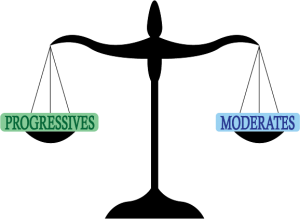The changing atmosphere of the 2020 election
October 13, 2019
After nearly three years since the election of Donald Trump for President, the country has drastically changed. Not only have violences such as school shootings and rates of white supremacist hate crimes shot up, but in response to these, the country has moved farther to the left in its political goals.
In the 2016 election, discussions of Medicare for All and debt-free college seemed like utopian ideals that were far too radical. A couple of years ago, it could have been a stretch to say that a progressive candidate could win, let alone receive the primary nomination. That’s most likely because the ideas seemed very new to the political frontier and in an election where moderates held most of the power, they couldn’t reach key bases. However, both are now looking possible and even likely.
Contrary to the 2016 election, the 2020 Democratic candidates have mostly all taken on a platform that endorses previously Bernie-centric promises. These changing times elucidate that the Democratic Party and younger progressive voices are finally getting a say in influencing politics. Issues such a Medicare, climate change, race, and economics for working class Americans are working to unite the foundation of the Democratic Party.
Though it is still very early in the campaign trail, the polls are looking hopeful for candidates such as Elizabeth Warren and Bernie Sanders who are appealing to working class voting bases. Voting blocs are one of the most important components of a candidate’s strategy. Without isolating important voting blocs, a candidate could never build enough support to win the election. According to the Pew Research Center, in 2016, the demographic for black voting rates dropped for the first time in 20 years. Contrary from previous elections when Barack Obama was on the ballot, the 2016 election failed to connect with key black voting groups, one of the main pitfalls of Hilary Clinton’s campaign.
I present this statistic to point out the importance of minority voters for the Democratic Party. Being able to address issues and promote policies that discuss economic and racial equality is extremely important, not just to create a more equitable society, but to increase the likelihood of a progressive Democrat winning the election. Although most of the candidates aren’t doing enough now to address racialized violence, pushing harder for reform and equality would push them closer to winning the election.
The election isn’t just different because of the leftward shift, but because of unfulfilled promises. Trump’s campaign path was littered with tales of all the changes he would make. After almost one term, few of his promises have amounted to much. Particularly, this can be seen in the impending economy.
According to CBS Trump’s belligerent trade war with China has put many economists on high alert for an impending recession. Because of the trade war increasing tensions with China, they have substantiated that they will no longer purchase categories of American goods such as agriculture, a practice that is having negative consequences for Trump’s voting blocs in rural America. The fracturing of the Trump campaign with agricultural interests was seen in an August poll from Morning Consult where Trump’s rating in Iowa was down 9 points, a dangerous place for a previously Trump-friendly state.
If Democrats can appeal to small farmers then they could gain a significant advantage over Trump in the 2020 elections. While some Progressives, such as Warren or Sanders, agree with the restrictions on trade, they are also pushing for more reforms to break down big Agriculture and improve the lives of everyday farmers in America. This balance is crucial to be able to offer an offset to the problems the trade war has created for this important industry.
The outlook for Progressives in the upcoming presidential election is uncertain, but the election of a more left directed candidate is possible if they target the right voting blocs and policies. Its critical that Progressives appeal to minorities and continue to push for policies that would benefit everyday people.


